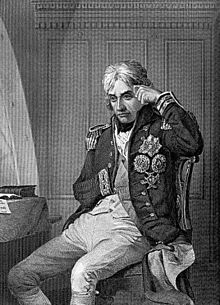Horatio Nelson
Appearance

Vice Admiral Horatio Nelson, 1st Viscount Nelson (September 29, 1758 – October 21, 1805) was a British naval officer.
Sourced quotes
- "Firstly you must always implicitly obey orders, without attempting to form any opinion of your own regarding their propriety. Secondly, you must consider every man your enemy who speaks ill of your king; and thirdly you must hate a Frenchman as you hate the devil."
- Simple: First, you must always follow orders right away, without trying to form an opinon of your own of them. Second, you must consider any man to be your enemy who speaks badly of your king. And third, you must hate a Frenchman as much as you hate the Devil.
- About the quote: To a midshipman aboard the Agamemnon (1793).
- "Our country will, I believe, sooner forgive an officer for attacking an enemy than for letting it alone."
- Simple: Our country will be more forgiving of an officer attacking an enemy, than letting it go.
- About the quote: About the attack on Bastin (May 3, 1794).
- "Let me alone: I have yet my legs and one arm. Tell the surgeon to make haste and his instruments. I know I must lose my right arm, so the sooner it's off the better."
- About the quote: After being wounded during the attack on Santa Cruz de Tenerife (July 24, 1797).
- "First gain the victory and then make the best use of it you can."
- Simple: First make it a victory, then make it as complete a victory as you can.
- About the quote: Before the battle of the Nile (August 1, 1797).
- "I cannot, if I am in the field of glory, be kept out of sight: wherever there is anything to be done, there Providence is sure to direct my steps."
- Simple: I cannot during a battle be kept out of sight: wherever something needs done, there I am sure to be found.
- About the quote: Said in 1797.
- "The Neapolitan officers did not lose much honour, for God knows they had not much to lose - but they lost all they had."
- Simple: The enemy officers did not lose much honour, because they had little to begin with.
- About the quote: After a French rout of the Neapolitan army (1798).
- "It is warm work; and this day may be the last to any of us at a moment. But mark you! I would not be elsewhere for thousands."
- Simple: It is dangerous work here, and we may die. But I would not be anywhere else for thousands.
- About the quote: ** At the Battle of Copenhagen (April 2, 1801).
- "Victory or Westminister Abbey."[1]
- Simple: Victory or death.
- About the quote: In the battle off Cape Vincent, giving order for boarding the San Josef.
- "In honour I gained them, and in honour I will die with them."[2]
- About the quote: When asked to cover the stars on his uniform to hide his rank during battle.
- "Duty is the great business of a sea officer; all private considerations must give way to it, however painful it may be."
- Simple: Duty is everything to a sea officer; anything personal must give way to it, however painful.
- About the quote: Letter to Frances Nisbet.
- "The measure may be thought bold, but I am of the opinion the boldest are the safest."[3]
- About the quote: To Sir Hyde Parker urging vigorous action against the Russians and Danes, March 24, 1801.

The Battle of Trafalgar (October 21, 1805)
- There are many accounts of Nelson's words prior to, and during this famous battle against the Napoleonic French and Spanish fleets, in which he was fatally wounded, with minor differences in wording and chronology. These quotations draw from direct readings of several of them.
- "Something must be left to chance; nothing is sure in a sea fight above all."
- About the quote: Before the battle of Trafalgar.
- "When I am without orders and unexpected occurrences arrive I shall always act as I think the honour and glory of my King and Country demand. But in case signals can neither be seen or perfectly understood, no captain can do very wrong if he places his ship alongside that of the enemy."
- Simple: Without orders I will always do as I believe the honour of my King and Country demand, but, no captain can go wrong by attacking.
- "This is too warm work, Hardy, to last long."
- Simple: This is too dangerous work to last very long Hardy (the Captain)
- About the quote: During the battle when his ship is under fire.
- "Kiss me, Hardy."
- About the quote: Some of his final words spoken to his Flag Captain, Thomas Masterman Hardy, who kissed his cheek and then his forehead.
- "Thank God, I have done my duty."
- About the quote: Statement among his final dying words.
- "God and my Country"
- About the quote: Some of his final words.

References
Other websites
 Horatio Nelson on Wikipedia
Horatio Nelson on Wikipedia- About Nelson
- The Death of Lord Nelson, 1807, by William Beatty from Project Gutenberg
- The Death of Nelson (1806) - painting by Benjamin West
- The Nelson Society
- Life onboard HMS Victory: an educational resource
- Tapping the Admiral from World Wide Words
